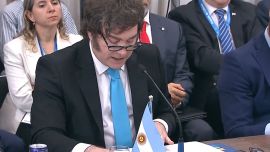Events in Bolivia have profoundly impacted the politics and societies of neighbouring countries, not the least of which is Argentina. And the departure of Evo Morales from power is opening up fault-lines in President Mauricio Macri's ruling Cambiemos coalition.
Congress convened for what was deemed “Super Wednesday” to pass a resolution on the events in Bolivia, as well as formally validate last month’s elections and acknowledge Alberto Fernández and Cristina Fernández de Kirchner as Argentina’s next president and vice president, respectively.
Ultimately, both the lower house Chamber of Deputies and the upper house Senate determined that Evo Morales’ exit from power qualified as a “coup,” with a measure to that effect passing thanks to support from the Cambiemos coalition and opposition lawmakers.
Mauricio Macri’s government has been tight-lipped on the issue in general, delivering comments like “we’re all worried about Bolivia.” Foreign Minister Jorge Faurie was more explicit, saying “the elements aren’t present” to qualify Morales' departure as a coup. The tepid response has led to fierce criticism from the opposition, as well as some defections from within the coalition who sought to back the measure in Congress on their own terms.
Lawmaker Daniel Lipovetzky, a member of Macri's centre-right Republican Proposal (PRO) party, made headlines when he strayed from the coalition’s de facto position, saying there’s “no doubt” that what took place in Bolivia qualifies as a “coup.”
“When it involves defending democracy, there can’t be any differences in a party,” he said, calling on Congress, the “place of the representatives of the people” to collectively reject the “overthrow.”
The unified congressional vote in favor of repudiating the “coup” contradicts Macri’s stance.
However, a difference in tone between peronismo and oficialismo did persist. In addition, the resolution passed by the Senate was ultimately more forceful in its language than that of the Chamber of Deputies.
Protests spill over to Buenos Aires
Bolivians residing in Argentina continued their protests, which began Tuesday, in front of Bolivia's Consulate in Buenos Aires today. Their march condemns what they see as the “coup” against Morales, while refusing to recognise senator Jeanine Áñez, who declared herself interim president by a faction of Bolivia’s Legislative Assembly without a debate or vote.
Demonstrators concentrated in front of the door of the consulate, located on Mitre 2815 in the Balvanera neighbourhood of the capital. They warned of the possibility of holding “vigil” there until the exiled leader of MAS (Movement to Socialsim) can return to Bolivia to govern.
The group also tied the overthrow and the institutional crisis in Bolivia to efforts of the United States, which recently acknowledged the senator as interim leader, along with Brazil and Russia.
According to Infobae, president-elect Alberto Fernandez said it would be a “pleasure” to offer asylum to Evo Morales, during a press conference in Montevideo after a meeting with Uruguay’s president Tabare Vazquez.
He also described Argentina as “the home of all Bolivians.”
– NA/TIMES



















Comments